|
|
|
Sort Order |
|
|
|
Items / Page
|
|
|
|
|
|
|
| Srl | Item |
| 1 |
ID:
155375
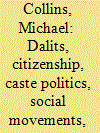

|
|
|
|
|
| Summary/Abstract |
This article examines the development and early politics of the Dalit Panther Iyakkam (DPI), or Dalit Panther Movement, of Tamil Nadu, India. Established in 1982, the DPI advanced a political programme that petitioned state authorities qua democratic citizens. By submitting written appeals through formal institutional channels, DPI organisers lobbied officials to perform their professional duties and advocated the delivery of rights, impartial administration of law, and equitable access to social and economic development. This article explores the initial phase of Dalit Panther politics in Tamil Nadu through its own documentary evidence, drawing upon DPI Chairman A. Malaichamy’s personal letters, written appeals, and received correspondence, as well as original pamphlets and handbills distributed at political rallies. Countering interpretations of Dalit assertion that accentuate ‘illiberal’ techniques as its natural form and state welfare as its principle target, the article shows that legal advocacy served as an integral feature of early DPI politics. But, when state institutions proved unresponsive and the movement developed a grassroots presence, DPI activists expanded their programme to encompass contentious street politics as a complementary means to make claims on state authority, amplify their voices to centres of power, and demand recognition as democratic citizens.
|
|
|
|
|
|
|
|
|
|
|
|
|
|
|
|
| 2 |
ID:
155379
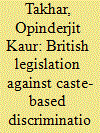

|
|
|
|
|
| Summary/Abstract |
On 23 April 2013, British Parliament agreed an Amendment on caste to the Enterprise and Regulatory Reform Bill (ERR Bill). The Bill received Royal Assent on 25 April 2013 and Section 97 of the ERR Act (that provides that Government ‘shall’ use Section 9(5)a to make caste an aspect of race) came into force on 25 June 2013. The Amendment will be made to the Equality Act 2010 by ‘adding caste as “an aspect of” the protected characteristic of race’ [Waughray, Annapurna. (2014). “Capturing Caste in Law: Caste Discrimination and the Equality Act 2010.” Human Rights Law Review 14 (2): 359–379.]. Importantly, although the Government’s timetable states that the legislation will be enforced not before October 2015, the considerable delay in implementation is consequential of the opposition from both Sikh and Hindu organisations. Most British Sikhs agreed that legislation against caste discrimination was unnecessary under British law. The Sikh Council UK (SCUK) declared that ‘caste allegiances were on their way out in the UK’ and demanded a Sunset Clause which essentially renders the caste legislation as temporary for a period of ten years, since the credence of the SCUK is that caste will have absolutely no significance for subsequent generations of British Sikhs. This paper provides an analysis of attitudes, primarily from the British Sikh and Punjabi Dalit communities, towards caste discrimination legislation in British Law, and in particular attitudes towards the proposal of the Sunset Clause.
|
|
|
|
|
|
|
|
|
|
|
|
|
|
|
|
| 3 |
ID:
155378
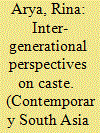

|
|
|
|
|
| Summary/Abstract |
Caste in its manifold aspects has been a feature of studies about the Indian subcontinent. In the last few decades scholarship has begun to examine the impact that caste has had on culture in the diasporas. This article is a study of inter-generational change in attitudes to caste within a group of Hindu Punjabis in the Greater Manchester area. The rationale is to explore whether ideas about caste are generally consistent within families or whether there are marked differences in attitudes between the generations. This is one way of establishing whether there has been a decline in the significance of caste in Britain.
|
|
|
|
|
|
|
|
|
|
|
|
|
|
|
|
| 4 |
ID:
155376
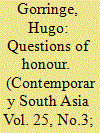

|
|
|
|
|
| Summary/Abstract |
Recent caste conflicts have revolved around discourses of honour, caste pride and shame. Although Dalit movements have been at the receiving end of the violence and have condemned the casteism underpinning it, they operate within a society in which questions of honour are highly significant. Dalit women activists are trapped in an unenviable position within the twin structures of caste and patriarchy, both of which speak to debates about group boundaries and honour. Taking the recent violence as its starting point, this paper draws on interviews with and observations of Dalit women in the Viduthalai Chiruthaigal Katchi (Liberation Panther Party) in Tamil Nadu to chart how discourses of honour both facilitate and constrain their capacity to act. For all the party’s emphasis on women’s rights, women activists face an uphill struggle to secure recognition, respect and responsiveness both within the party as well as wider society.
|
|
|
|
|
|
|
|
|
|
|
|
|
|
|
|
| 5 |
ID:
155377
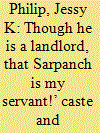

|
|
|
|
|
| Summary/Abstract |
Much of the research exploring democratisation of rural society has focused on changes occurring in the formal political process of elections. In contrast, this article examines the extent of democratisation and the decline of caste in rural society by investigating morality and interactions in diverse political spaces of a village in south India. Our findings suggest that although caste hierarchy and the ideology of patronage have lost their legitimacy in regulating interactions in the course of formal political processes such as elections and institutions of local administration, they continue to command the moral allegiance of village society in the domain of everyday social and political interactions. The study concludes that although there are significant discontinuities in the use of caste power in rural India, caste dominance continues to persist.
|
|
|
|
|
|
|
|
|
|
|
|
|
|
|
|
|
|
|
|
|